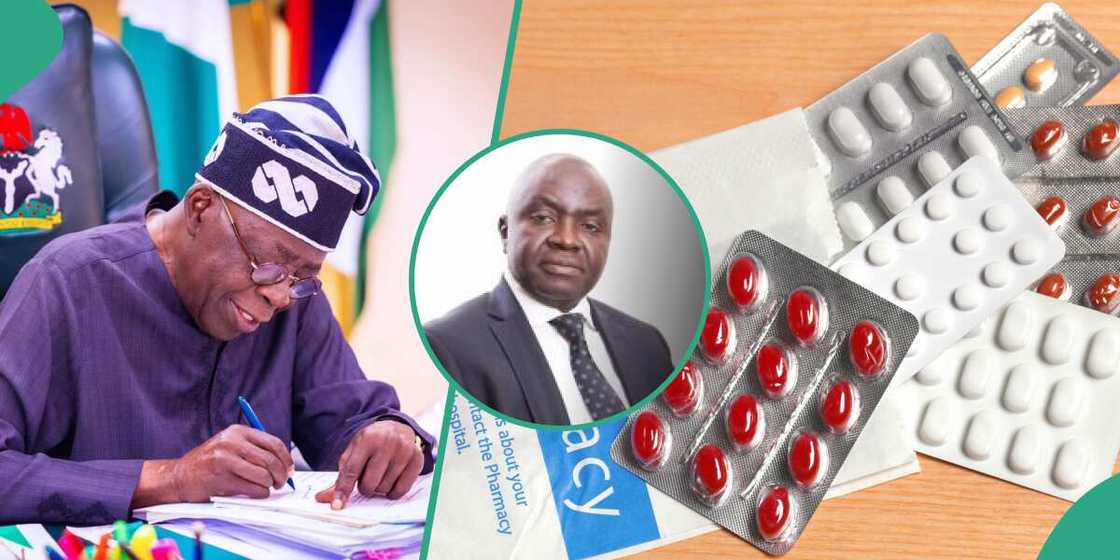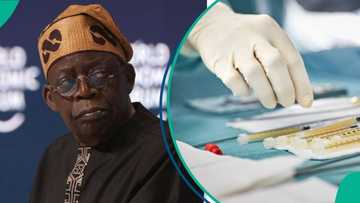‘We Need More’: Expert Praises Tinubu's Decision to Remove Tax from Imported Pharmaceutical Inputs
- President Tinubu has signed an executive bill that removes taxes on imported pharmaceutical inputs
- The president's decision is expected to lower production costs, making essential medicines more affordable for Nigerians
- Muda Yusuf, Director/CEO of the Centre for the Promotion of Private Enterprise, told Legit.ng that the president's decision is commendable
Legit.ng journalist Dave Ibemere has over a decade of business journalism experience with in-depth knowledge of the Nigerian economy, stocks, and general market trends.
The Centre for the Promotion of Private Enterprise (CPPE) has praised the recent executive order signed by President Bola Tinubu, which removed import duties, VAT, and excise duty on pharmaceutical raw materials, intermediate products, medical diagnostic equipment, and machinery.

Source: Getty Images
Muda Yusuf, director/CEO of CPPE, in a message to Legit.ng explained that the president's decision could revitalise Nigeria's pharmaceutical sector and create more employment opportunities.
He added that the measures will bolster local pharmaceutical production, lower medication costs, enhance healthcare accessibility, and positively impact citizens' well-being.
PAY ATTENTION: Share your outstanding story with our editors! Please reach us through info@corp.legit.ng!
His words:
"These fiscal policy measures could enhance domestic pharmaceutical production, lower medication expenses, improve healthcare accessibility, and benefit citizens' well-being.
"The initiative would rejuvenate our pharmaceutical sector, generating additional employment. Targeted fiscal policies are crucial for tackling supply-side challenges effectively.
"Boosting production is crucial to alleviating current inflationary pressures, which are largely driven by supply-side challenges."
CPPE advocates for similar gestures
Speaking further, the CPPE boss called on the president to extend similar fiscal incentives to other sectors such as agriculture, agrochemicals, agro-allied industries, energy, and iron and steel.
He stressed that such measures are essential for addressing supply-side economic challenges, particularly inflationary pressures driven by supply constraints.
"We also need fiscal policy protection to support domestic investments in petroleum refineries to conserve foreign exchange, create jobs, and enhance backward integration.
"There is a rising tide of economic nationalism globally, and we should respond by strengthening our domestic production capabilities across all sectors.
"Fiscal policy measures have proven more impactful on real sector performance than monetary policy. The real sector deserves effective protection and incentives to improve production and ensure sustainable investments."
Yusuf noted that the economy will be better in the long term.
The economist added:
"We believe that enhancing fiscal policy interventions will facilitate this objective, even if it requires short-term revenue sacrifices.
"The economy will benefit in the medium to long term through increased domestic production, reduced import dependence, disinflation prospects, higher job creation, and improved economic resilience."
Tinubu signs executive orders on oil, gas
Legit.ng also reported that President Bola Tinubu has approved three new directives in the oil and gas sector.

Read also
Why Bolt is the most attractive ride-hailing service in Nigeria - Country Manager, Yahaya Mohammed
This introduces fiscal incentives for related projects, reduces contracting costs and timelines, and promotes cost efficiency in local content requirements. It further said that in recognition of the urgency to accelerate investments, President Tinubu directed the introduction of fiscal incentives for non-associated gas, midstream and deepwater developments.
The special adviser on media and publicity, Ajuri Ngelale, confirmed the development on Wednesday via a statement shared on the X account of the @NGRPresident.
PAY ATTENTION: Unlock the best of Legit.ng on Pinterest! Subscribe now and get your daily inspiration!
Source: Legit.ng




